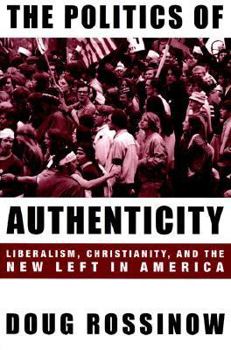The Politics of Authenticity: Liberalism, Christianity, and the New Left in America
Select Format
Select Condition 
Book Overview
In the 1960s a left-wing movement emerged in the United States that not only crusaded against social and economic exploitation, but also confronted the problem of personal alienation in everyday life.... This description may be from another edition of this product.
Format:Paperback
Language:English
ISBN:023111057X
ISBN13:9780231110570
Release Date:October 1998
Publisher:Columbia University Press
Length:520 Pages
Weight:0.25 lbs.
Dimensions:1.1" x 6.1" x 9.0"
Related Subjects
20th Century Anthropology Christian Books & Bibles Civil Rights Civil Rights & Liberties Conservatism & Liberalism Cultural History Humanities Philosophy Political Science Politics & Government Politics & Social Sciences Religious Studies Social Science Social Sciences Sociology Specific TopicsCustomer Reviews
3 ratings
Reviewing This Book is Reviewing My Own History
Published by Thriftbooks.com User , 14 years ago
Doug Rossinow's book was recommended to me by someone who knew that I would be quite familiar with the Austin, Texas setting, the people, and the era of the prime illustrations for his text. This turned out to be true, and therefore it was of interest to me. However, I would have to say that his political philosophy and theological discourse is not easy for the typical lay reader to follow.
the new left
Published by Thriftbooks.com User , 17 years ago
Unlike many histories of the New Left, which emphasize its exceptionalism and separatism, this one emphasizes the Left's continuing conversations with other traditions of American reform-Christian evangelicalism, the Social Gospel, the lyrical Left, mainstream feminism--even liberalism. For example, Rossinow stresses the importance of the populist liberalism of the Lone Star State to the social construction of the Texas New Left. Early leftists were encouraged by liberals like Ronnie Dugger, and later leftists found that they could form some constructive coalitions with liberals. While Rossinow acknowledges the general hostility of the Left to liberalism, he also shows that leftists could be creatively eclectic and inconsistent in forming coalitions. Like other Sixties analysts, Rossinow shows how, as Kurt Vonnegut said, "America radicalizes Americans." Indeed, non-leftists shaped the late Sixties Left by their intransigence and their attacks. University repression, Black Power, and the Vietnam War also drew leftists away from the optimistic assumptions of the early years. Still, this backlash also led to the richness of "new working class" analysis, which Rossinow explains extraordinarily well. The idea that "alienation isn't restricted to the poor" (p. 194) allowed leftists a wider range for radicalism, interrogating most of the institutions of American society. When the Vietnam War ended, and the national Left disintegrated, this wide-ranging cultural activism was what was left. By the end of the decade, the emphasis on authenticity, coupled with the intransigence of the political "System" and the factionalism of the Left, led activists to an emphasis on cultural change through counter-cultural living. Instead of overthrowing American government, they would undermine American society by creating a new society in the shell of the old. Like the New Left, the counter-culture emphasized authenticity. Indeed, Rossinow suggests that "starting in 1966, counter-cultural activity became "the new left's most important strategy for fomenting social change in America" (p. 251). Like the lyrical Left of the early twentieth century, this prefigurative politics had its own (usually small, usually local) successes, but it also succeeded in bringing cultural issues into mainstream American politics, most often in the Democratic Party. And as Rossinow points out, it complemented the cultural modernism of the American middle classes. In either case, cultural radicalism became cultural meliorism, and reinforced the liberal individualism of the mainstream culture. This book is valuable, not just for its own original and nuanced interpretation of Sixties politics, but for its historiographical insights. Rossinow knows virtually all of the literature on Sixties politics, and, both in the text and in the footnotes, he sets his interpretation in conversation with other Sixties analysts. The result is not just a first-rate monograph that complexifies the Sixties, b
Nothing but the facts...
Published by Thriftbooks.com User , 22 years ago
Rossinow paints a detailed picture at the activist life of the University of Texas during the days of the SDS and SNCC. It is amazing that someone like himself, who wasn't there and is much younger than the participants, can create such a tale. I'm too young to have been there also, but I've had the opportunity to meet some of these incredible people in my time here at UT-Austin. The activist blood still runs warm here, and will for years to come, and it is because of the people Rossinow has chronicled in this book. Want to know how things happened? Here it is. Want to be inspired toward change? Here it is.





